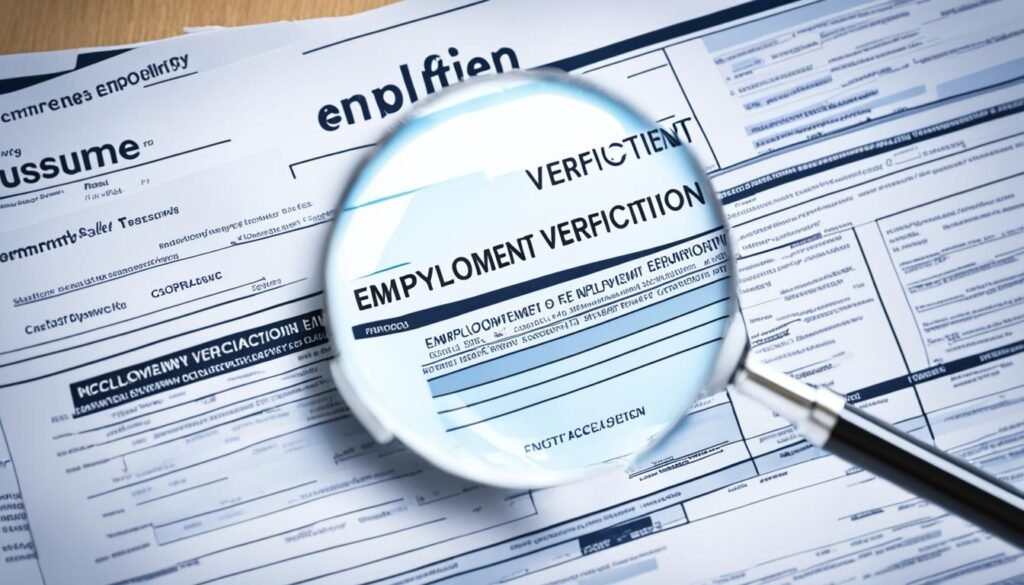Did you know that a staggering 85% of employers in the United States conduct employment verification checks on job applicants? This striking statistic underscores the importance that companies place on validating the work experience and qualifications claimed by individuals seeking employment. Your employment history can indeed be verified by potential employers during the hiring process, and this practice is becoming increasingly commonplace as organizations strive to mitigate the risks associated with hiring candidates who may have falsified their employment records.
Verifying work experience is a crucial step in the hiring process, as it helps employers assess the qualifications and competencies of job applicants. The process of employment verification typically involves contacting previous employers, conducting background checks, and utilizing third-party services to validate the details provided on a job application. This thorough approach ensures that employers make informed hiring decisions and avoid the potential consequences of hiring individuals who have misrepresented their employment history.
Key Takeaways
- Employment history verification is a common practice among employers in the United States.
- Verifying work experience helps employers assess the qualifications and competencies of job applicants.
- The employment verification process involves contacting previous employers, conducting background checks, and using third-party services.
- Employers use employment verification to mitigate the risks associated with hiring individuals who have falsified their employment records.
- Understanding the importance of employment verification is crucial for both employers and job seekers.
The Importance of Employment Verification
Verifying your work history is a critical step in the hiring process that employers take to assess your qualifications and ensure the accuracy of the information you’ve provided. By conducting employment verification, employers can better understand your skills, experience, and integrity, which are all essential factors in making informed hiring decisions.
Why Employers Verify Work Experience
Employers verify your work experience for several key reasons. First and foremost, it helps them evaluate whether you possess the necessary skills and expertise to perform the job duties effectively. By confirming your previous roles, responsibilities, and achievements, employers can determine if you are a good fit for the position they are seeking to fill. Additionally, the employment verification process allows employers to identify any discrepancies or inconsistencies in the information you’ve presented, which could raise concerns about your honesty and trustworthiness.
Consequences of Falsifying Employment Records
The consequences of falsifying your employment records can be severe, both for you as a job seeker and for the employer who hires you. If an employer discovers that you’ve provided false or misleading information about your work history, it can lead to immediate termination of your employment, legal issues, and potentially long-lasting damage to your professional reputation. Employers take the integrity of their hiring process very seriously and will not hesitate to take action against candidates who have been dishonest about their employment background.

Methods Used for Employment Verification
When it comes to verifying your employment history, employers utilize a variety of methods to confirm the details you’ve provided. The most common approach is to directly contact your previous employers to validate information such as your job titles, dates of employment, and reasons for leaving each position.
Contact with Previous Employers
Reaching out to your former employers is a crucial step in the employment verification process. Potential employers may want to verify the dates you worked, the responsibilities you held, and the circumstances under which you departed. This helps them assess the accuracy and consistency of the information you’ve presented on your job application.
Background Checks and Third-Party Services
In addition to contacting previous employers, employers may also conduct comprehensive background checks. This can include verifying your educational credentials, checking for any criminal records, and utilizing third-party services to validate the employment history you’ve provided. Services like The Continents States University can offer detailed employment histories and confirm the accuracy of the information on your job application.

Can Employment History Be Verified
When it comes to the hiring process, employers often take steps to verify the employment history provided by job applicants. This is an essential step in assessing the qualifications and integrity of potential hires. Employers typically focus on validating a range of information, including the types of information verified in employment history and addressing any challenges that may arise during the verification process.
Types of Information Verified
During the employment verification process, employers typically look to confirm a variety of details about an applicant’s work history. This can include verifying job titles, dates of employment, job responsibilities, and the reasons for leaving previous positions. By cross-checking this information, employers can gain a better understanding of the applicant’s work experience and ensure that it aligns with the details provided on their resume or job application.
Challenges in Verifying Employment History
While employment history verification is a common practice, there can be some challenges that arise during the process. For instance, if an applicant has gaps in their work history or has worked for smaller or lesser-known companies, it may be more difficult for employers to obtain comprehensive and accurate information. Additionally, some previous employers may be unwilling or unable to provide detailed feedback about a former employee, making it challenging to fully validate the applicant’s work experience.

Preparing for Employment Verification
To ensure a successful employment verification process, it is crucial for job seekers to maintain accurate and up-to-date records of their work history. This includes keeping copies of pay stubs, W-2 forms, and any other documentation that can substantiate your employment claims. By maintaining these accurate employment records, you can demonstrate your professionalism and commitment to transparency during the hiring process.
Maintaining Accurate Records
Maintaining accurate records of your employment history is a critical step in preparing for employment verification. Employers will often request documentation to verify the details you have provided on your job application, such as job titles, dates of employment, and job responsibilities. By keeping meticulous records, you can ensure that the information you provide is consistent and accurate, which can help build trust with potential employers.
Addressing Employment Gaps
Another important aspect of preparing for employment verification is addressing any gaps in your employment history. Employers may view unexplained gaps as a red flag, so it is important to be transparent and provide a clear explanation for any periods of unemployment. By addressing these gaps proactively, you can demonstrate your honesty and commitment to the hiring process, which can ultimately increase your chances of securing a job offer.
Legal Considerations and Best Practices
When it comes to employment verification, employers must adhere to various legal requirements and best practices to ensure a fair and compliant process. This includes obtaining the applicant’s consent before contacting previous employers, respecting the applicant’s privacy, and ensuring that the verification process is non-discriminatory.
Employers should be mindful of state and federal laws that govern the collection and use of employment-related information. By following these legal guidelines, employers can maintain the integrity of their hiring process while respecting the rights of job applicants. This is crucial for [legal considerations in employment verification] and [best practices for employers] to consider during the hiring process.

Additionally, employers should strive to implement best practices that promote transparency and consistency in their employment verification procedures. This may include clearly communicating the verification process to applicants, providing opportunities for them to address any discrepancies, and ensuring that the process is applied uniformly across all candidates.
By adhering to legal requirements and adopting best practices, employers can build trust with job applicants, demonstrate their commitment to fairness, and ultimately make more informed and reliable hiring decisions. This approach not only benefits the employer but also fosters a positive and equitable hiring experience for the applicant.
Tips for Job Seekers
For job seekers, navigating the employment verification process can be a critical step in securing your dream job. To ensure a successful outcome, it’s essential to approach this stage with [tips for job seekers] and a commitment to honesty and transparency.
Being Honest and Transparent
The first and most crucial tip for job seekers is to be [being honest in employment verification] throughout the entire process. This means providing accurate and complete information on your job applications, and being prepared to address any discrepancies or gaps in your work history. By demonstrating your integrity, you can build trust with potential employers and increase your chances of a successful hiring outcome.
Proactive Approach to Verification
In addition to honesty, job seekers can also take a [proactive approach to employment verification] by maintaining detailed records of their employment history. This includes keeping copies of pay stubs, W-2 forms, and any other documentation that can substantiate your claims. Being ready to provide this information to potential employers can streamline the verification process and showcase your commitment to transparency.
Conclusion
In conclusion, your employment history can indeed be verified by potential employers during the hiring process. This verification process is essential for employers to assess the qualifications and integrity of job applicants, and to make informed hiring decisions. By understanding the importance of employment verification, the methods used, and the legal considerations involved, both you as a job seeker and employers can navigate the process effectively and ensure a fair and successful hiring outcome.
As you prepare for your next job opportunity, remember to maintain accurate records of your work history and be transparent about any gaps or discrepancies. By taking a proactive approach to employment verification, you can demonstrate your commitment to honesty and increase your chances of securing the position you desire. The successful verification of your employment history can be a critical step in your journey towards a rewarding career.
Ultimately, the employment verification process serves to benefit both employers and job seekers alike. By upholding the integrity of the hiring process, it ensures that qualified and trustworthy individuals are selected for available roles, contributing to the overall success of the organization. As you navigate this process, focus on presenting a clear and accurate picture of your employment history, and you’ll be well on your way to a positive hiring outcome.


